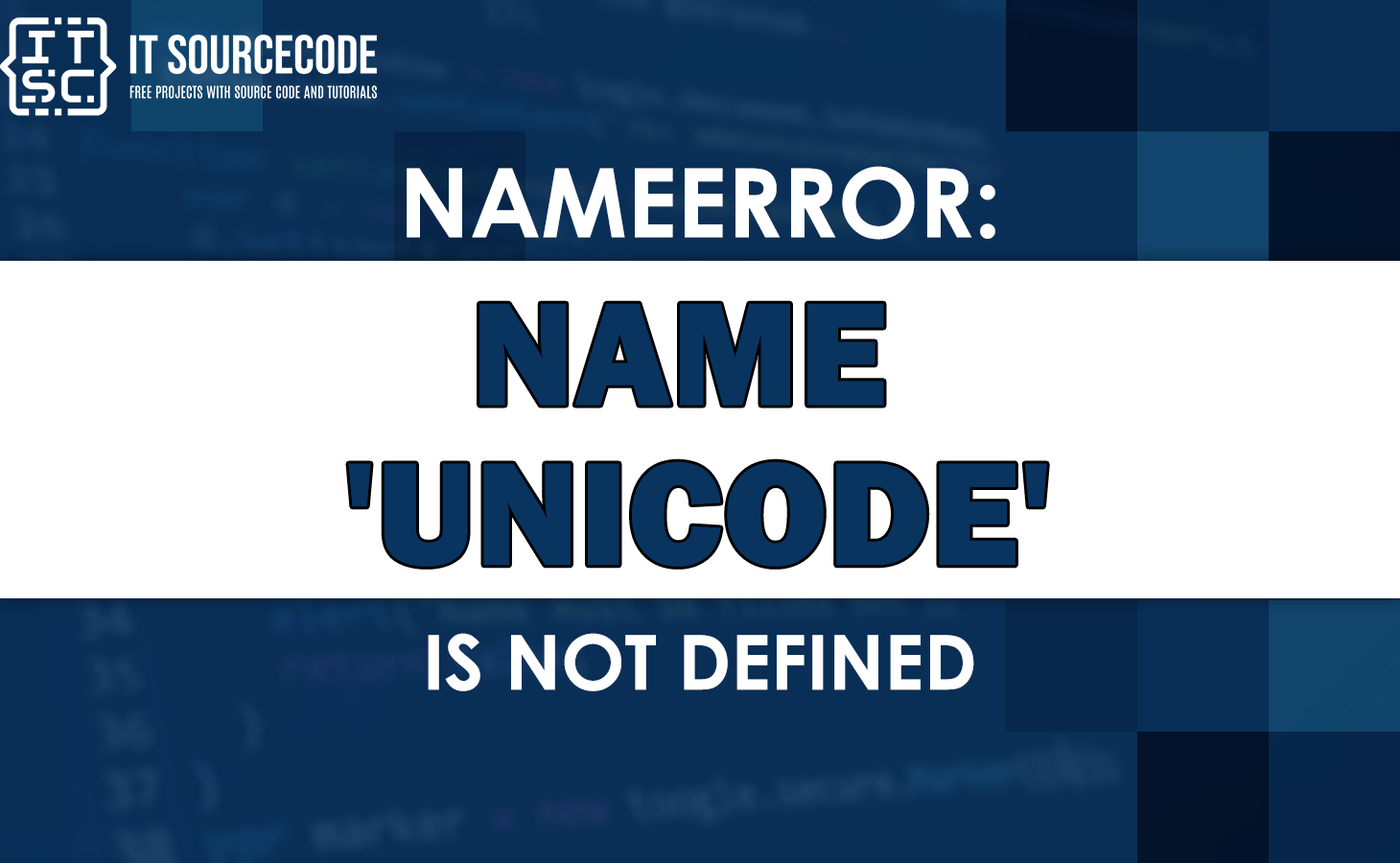Tired of figuring out the solution for the Python nameerror: name unicode is not defined error message?
Well, this article got your back. Want to know why?
In this article, we will hand you the solutions for nameerror name ‘unicode’ is not defined.
Apart from that, you’ll have a better understanding of this error.
So without further ado, let’s get started.
What is “unicode” in Python?
Unicode is a standard for representing characters from different writing systems in a consistent way.
In Python, unicode strings are represented using the “str” data type.
What is “nameerror: name unicode is not defined”?
The nameerror: name ‘unicode’ is not defined error message occurs when you try to use the Python 2 script unicode built-in function in Python 3.
In Python 3, unicode has been renamed to str.
For example:
sample_string = unicode("Hi, Welcome to Itsourcecode!")
print(sample_string)If we run this code, the output would be:
NameError: name 'unicode' is not definedThe error occurs because the “unicode” function is not defined or it has been renamed in Python 3.
Instead, you can use the “str” function to create unicode strings.
How to fix “nameerror: name unicode is not defined”?
To fix the nameerror: name ‘unicode’ is not defined, you have to replace all instances of unicode() with str() if you are working in Python 3.
Here are the following solutions you can use to fix this error:
Solution 1: Replace “unicode()” with str()
You can easily resolve the error by replacing all instances of unicode() with str() if you are working in Python 3.
❌ Incorrect code that leads to “nameerror: name unicode is not defined“:
sample_string = unicode("Hi, Welcome to Itsourcecode!")✅ Corrected code that uses the “str” function:
sample_string = str("Hi, Welcome to Itsourcecode!")
print(sample_string)
Output:
Hi, Welcome to Itsourcecode!Solution 2: Replace “unicode()” with byte() function
You can also use the bytes() function to resolve the error. Bytes() function is used if you are dealing with the binary data type.
sample_string = 'Hi, Welcome to Itsourcecode!'
binary_data = bytes(sample_string, 'utf-8')
print(binary_data)Output:
sample_string = 'Hi, Welcome to Itsourcecode!'
binary_data = bytes(sample_string, 'utf-8')
print(binary_data)Solution 3: Import the “unicode” object
If you still need to use the “unicode” object in Python 3.
You can do that by importing the “unicode” object from the “builtins” module.
❌ Incorrect code:
unicode_string = unicode("Hi, Welcome to Itsourcecode!!")✅ Corrected code:
from builtins import unicode
unicode_string = unicode("Hi, Welcome to Itsourcecode!")Solution 4: Use if statement to check the Python version
If you need to create unicode strings that are compatible with both Python 2 and Python 3.
You can use if statement to check the Python version and use the appropriate function.
✅ import sys
if sys.version_info.major < 3:
unicode_string = u"Hi, Welcome to Itsourcecode!"
else:
unicode_string = str("Hi, Welcome to Itsourcecode!")
print(unicode_string)
Output:
Hi, Welcome to Itsourcecode!
Solution 5: Declare “unicode” variable
You have to declare a unicode variable and set its value to the str class.
✅ import sys
if sys.version_info[0] >= 3:
unicode = str
print(unicode('Hi, Welcome to Itsourcecode!'))
Output:
Hi, Welcome to Itsourcecode!Solution 6: Use the past library
Alternatively, you can use the past library to make your code compatible with both Python 2 and 3.
✅ from past.builtins import unicode
sample_string = unicode('Hi, Welcome to Itsourcecode!')
print(sample_string)Output:
Hi, Welcome to Itsourcecode!Conclusion
The nameerror: name ‘unicode’ is not defined error message occurs when you try to use the Python 2 script unicode built-in function in Python 3.
The unicode() function in Python 3 has been renamed as str(). So, if you are working in Python 3, you have to replace all the unicode() with str().
Take note that the str() function can only replace the unicode() when the data is text-type.
This article already provides solutions that will help you to fix the Python error message.
You could also check out other “nameerror” articles that may help you in the future if you encounter them.
- Nameerror: name os is not defined
- Nameerror: name self is not defined
- Nameerror: name random is not defined
Hoping that this article helps you fix the error. Thank you for reading itsourcecoders 😊

